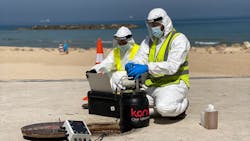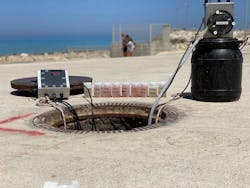Israeli scientists pinpoint COVID-19 outbreaks in sewer surveillance pilot project
ISRAEL -- Kando, a leader in wastewater management technology, along with leading researchers from top Israeli institutions including Ben Gurion University and the Technion, announced today initial findings of a pilot project aimed at detecting outbreaks of COVID-19 in the city of Ashkelon, Israel (approx. 150,000 residents), by identifying traces of the coronavirus in the municipal sewage system. The research demonstrated the ability for early detection of outbreaks in wastewater. This city-scale pilot study also demonstrated the ability to locate hotspots down to specific neighborhoods and even city streets.
The coastal city of Ashkelon was chosen as the pilot site as it was believed to have a low number of cases, aside from the city’s “coronavirus hotels” housing COVID-19 patients. But what researchers discovered was something entirely different: significant remnants of the coronavirus in municipal wastewater, indicating early detection of outbreaks in local neighborhoods.
The results suggest that tracking coronavirus remnants in the sewer network is a timelier and more efficient gauge of the extent of outbreaks than testing individuals – especially given the asymptomatic nature or delay in symptoms of those suffering from COVID-19.
The results of the pilot study will offer authorities capabilities for early detection of new outbreaks and can help avoid total lockdowns by pinpointing affected areas. Helping identify hubs of contagion can allow a much more localized response – avoiding the need for more sweeping lockdown measures.
“Identifying traces of the coronavirus in city wastewater is extremely challenging due to the various types of substances found in sewage systems, including industrial wastewater, which can dilute or destroy remnants of the virus,” said Professor Nadav Davidovitch, Director, School of Public Health at Ben Gurion University. “Our unique methodology enables us to detect and trace the presence of the virus and calculate its concentration with these substances factored into the equation, and to integrate epidemiological evidence in order to pinpoint emerging COVID-19 hotspots. This will allow authorities to take actions to contain future outbreaks. This type of interdisciplinary science will continue to help disease containment methods – for coronavirus, and beyond.”
“Monitoring our sewers is like taking the ‘blood test’ of a city,” said Ari Goldfarb, CEO of Kando. “The successful initial results of this pilot study demonstrate that our sophisticated wastewater monitoring systems can help detect new outbreaks and determine exactly where and how serious they are. Along with our distinguished partners at Ben Gurion University and the Technion, we’ve demonstrated that we can offer actionable insights to authorities, alarming them to outbreaks even before residents are symptomatic. Our hope is to help cities around the world prevent wholesale shutdowns and mitigate future outbreaks.”
SOURCE: Kando

